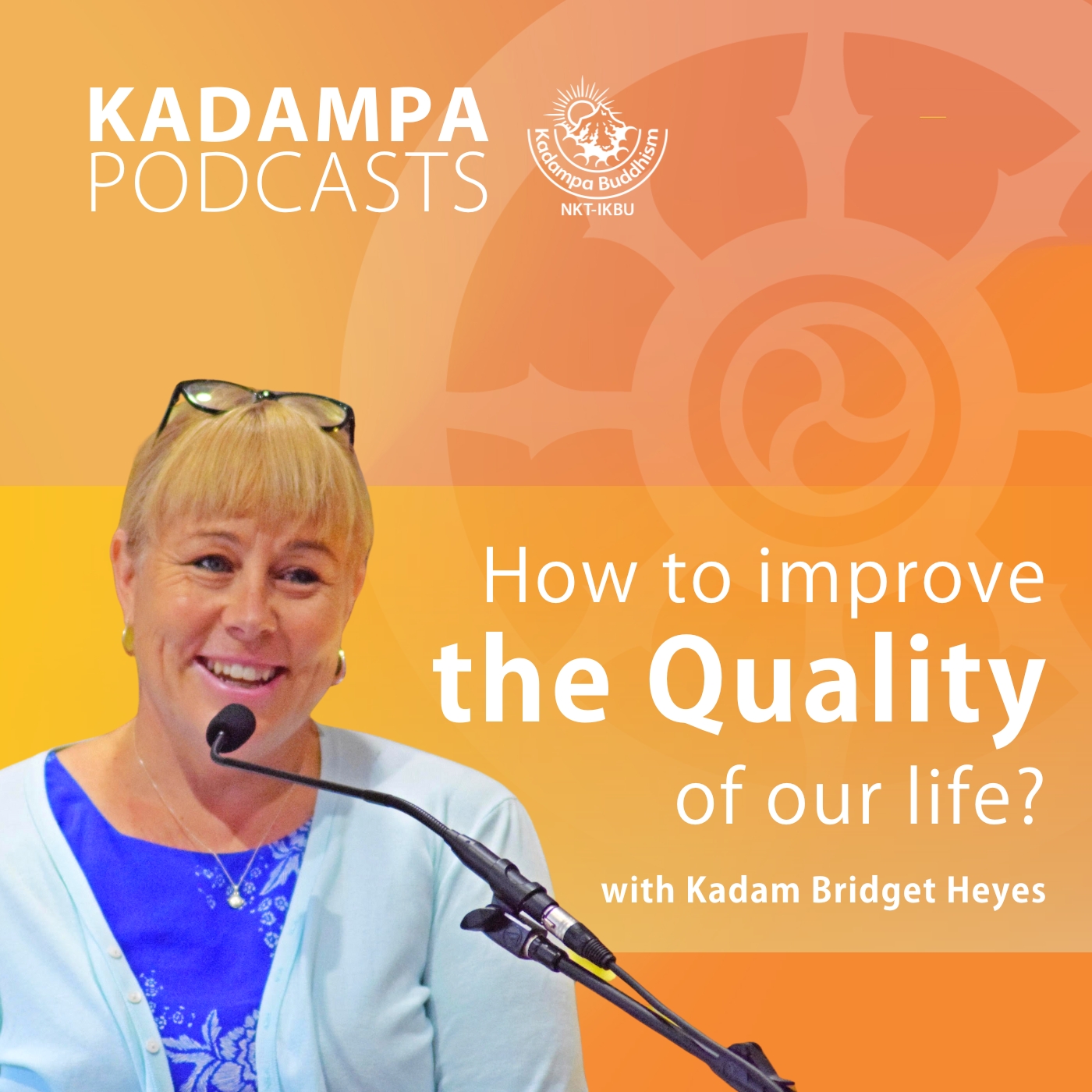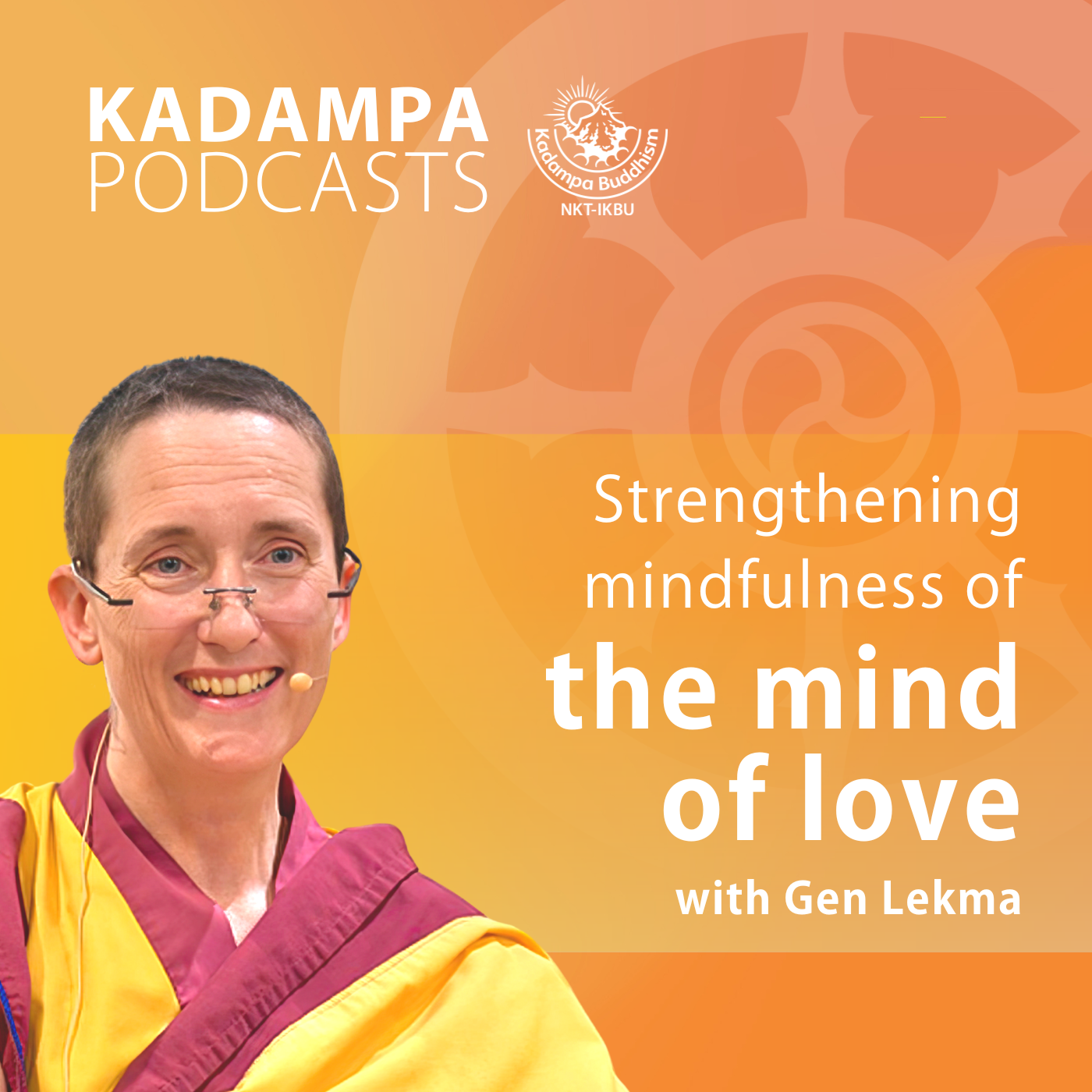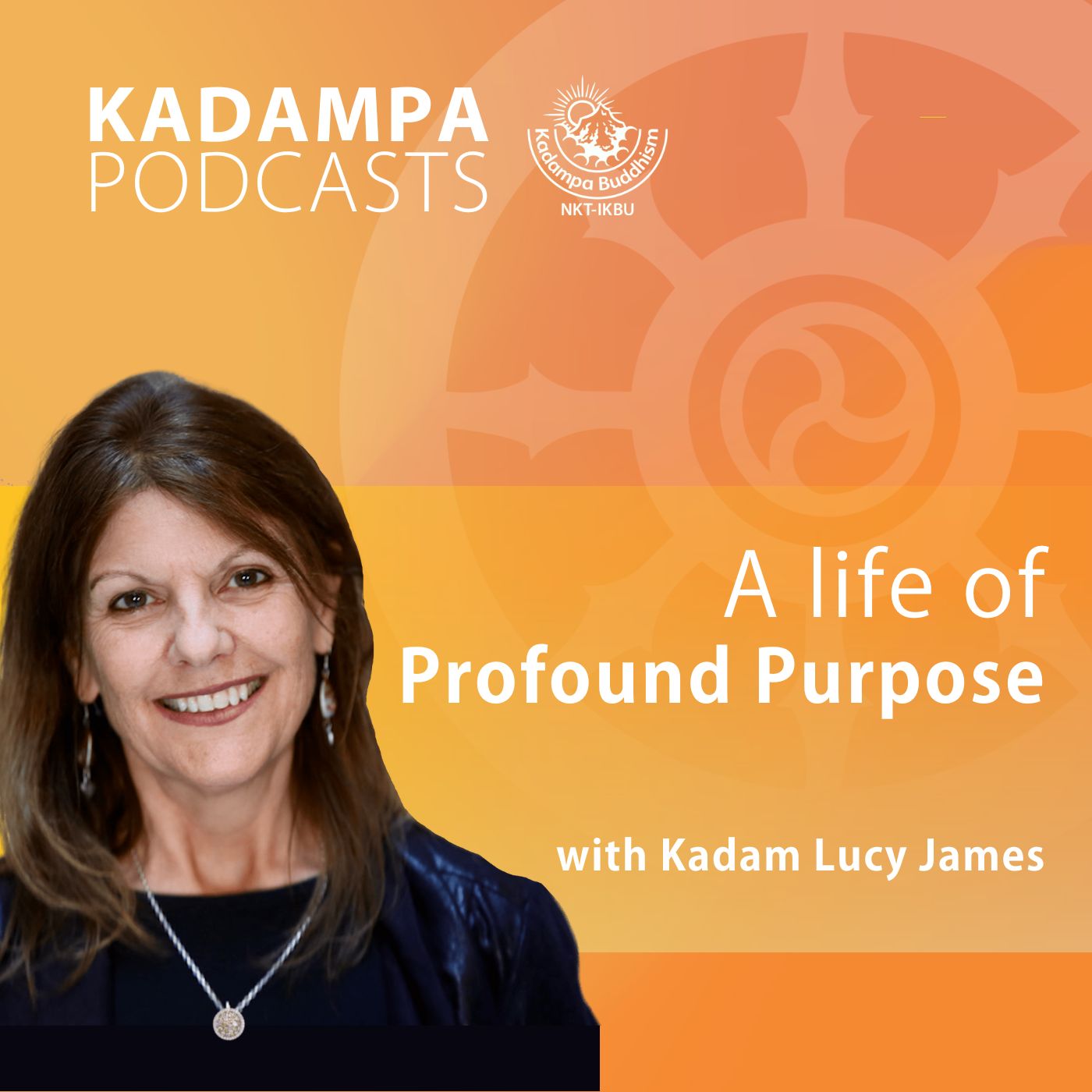Episode Transcript
Welcome to Kadampa Podcasts.
These podcasts offer practical solutions to daily challenges and help guide us to a happier and more peaceful state of mind.
In each episode you will find an extract from a teaching given by one of various Kadampa Buddhist teachers worldwide.
All these teachings are inspired by the profound wisdom of Venerable Geshe Kelsang Gyatso Rinpoche, a Buddhist master for our time.
We hope you will enjoy listening.
The Mind of a Buddha If we have a certain experience, and then we identify with that experience, we have a sense of self.
So let's, the examples I gave last week, let's say we are experiencing anxiety, I can't remember which examples I used, but let's say we have some anxiety arising in our mind, and we think, you know, I can't be happy unless this happens, this is worrying me, and we chew over it, and some anxiety has arisen in our minds, and then we think, I am anxious.
We don't just think, some anxiety has arisen in my mind, like a cloud in the vast, clear, boundless expanse of a clear sky, which is Buddha's analogy for our mind, a cloud that just appears and will disappear again later, a cloud that has appeared in dependence upon various causes and conditions, ways of thinking about things, but it will also disappear again in time.
Now we think that we are that cloud.
We think, I am anxious.
Right?
So that sense of self depends on that experience of anxiety, but instead of thinking this anxiety is not who I am, it's just a cloud arising in the sky of my mind, do you see what I'm saying?
Instead of thinking it's not just a fleeting cloud, we think, I am anxious.
We have imputed our I, or identified our I, with the anxiety, and then we hold on to it with what's called self-grasping ignorance.
We believe that's me.
I am anxious.
If a cloud appears in the sky, so Buddha's analogy for our minds, our potential, he said our minds are like these vast, boundless sky, and if you can imagine a sky that has no limits, no boundaries, and within our mind is extraordinary capacity for change, extraordinary potential for happiness and peace lies within our mind, this is Buddha's understanding and explanation.
There's an extraordinary capacity for love.
We can learn to love everybody.
We think, no we can't, a hundred people at most.
Quick thought experiment actually, I just want you to briefly close your eyes and just have a thought for me, if you wouldn't mind.
A thought experiment.
If you could just develop this thought.
How wonderful it would be if everybody was happy.
If everybody was peaceful and happy.
If nobody had mental pain, physical pain.
How wonderful that would be.
I think may everyone be happy, may everyone be free.
Okay, thank you.
Did you develop that thought?
So you touch then upon the boundless nature of your mind at that time, because what that thought is, it's universal love.
The wish for everyone to be happy is universal love.
The wish for everyone to be free from their pain, mental pain, physical pain, is universal compassion.
Those are big minds.
With that we can sense the expanse of our mind, the potential of our mind.
To not just be in a kind of pokey, small world of just a few people, mainly us, and anyone who's nice to us, amounts to four people, one and a half, maybe on a good day.
And then everyone else can basically-- basically everyone else is not interesting to us or else we don't like them.
That's typically how we can go through our day if we're not careful.
Me, a few people around me who are nice to me, and everyone else is, you know, take them or leave them.
And that's a kind of small pokey mind.
And we call it self-grasping, self-cherishing, just a very limited sense of ourself.
But the truth is it's not fixed.
That's not who we actually are.
It's just familiarity.
The reason we have small pokey minds is because we're used to having small pokey thoughts.
But the point is we can change.
We can totally liberate our mind.
That's why Buddha taught, gave all these teachings, to show us how we could do that.
There's nothing fixed about us.
And the fact that you're able to develop this thought, "May everyone be happy," when all I did was say, "Just please develop this thought, 'May everyone be happy.'"
As I said, I didn't give you that three months of teachings on developing universal love.
I mean, we can, we do.
We learn these things here, how to develop these minds.
Of course, it's a meditation practice, is four.
But I didn't, on this occasion, I just said, "Try and do it."
And you tried, and you did it.
Doesn't that tell you something quite remarkable about your minds?
How much we sell ourselves short in terms of thinking about our potential.
Because if just upon a simple instruction, "Please develop this thought," you did develop that thought, "May everyone be happy."
Even if it was very quick, even if it was quite superficial, even if it didn't stick around that long, you know, even if it didn't go all that deep, even if it was quite vague, you still did it.
And you did it in two seconds.
To be honest, that just shows the potential we have for developing universal love that is there all the time.
Universal love that is very deep.
Universal love that fills our mind all the time.
So wherever we go, we like people, we love them, we want them to be happy, wish them well, we don't want them to suffer.
It is quite possible to develop universal love, so it is in our heart all the time.
And it is quite possible to develop universal compassion.
And it is quite possible to develop wisdom.
And all these other positive and extraordinary big thoughts, different states of mind, that lead us progressively to deeper and deeper states of happiness and mental freedom, and make us more and more helpful in this world for other people.
And more and more a source of refuge for others, a source of strength, a source of support, a source of kindness, a source of wisdom.
Every single person in this room has that potential.
And it is not just because you are in this room, right?
Everybody has it.
Everyone in this room has it.
There is not a single person in here, I would literally stake my life on that, there is not a single person in this room who doesn't have that potential.
Because everybody has it.
This is kind of the starting point for Buddhist meditation practice, is this understanding that nobody is fixed.
That lack of being fixed and stuck and limited is what we call our Buddha-nature.
The fact that we depend upon thought, we depend upon our experiences, we can change those, meaning that we can change ourself, shows that there is nothing fixed about us, and that, within that, is the seed or the potential for boundless transformation.
So that instead of thinking self-centered thoughts, we can think thoughts wishing everyone to be happy, instead of feeling anxious thoughts, we can develop thoughts of fearlessness, developing thoughts of sadness, depression, hopelessness, we can develop thoughts of self-confidence, joy, bliss.
And as we change our thoughts, we start to change ourselves.
By learning, the quickest way to change ourselves is to, on the basis of developing different experiences, different states of mind through meditation, is then learning to identify with those.
So this is kind of the wisdom part.
Forget willpower, try wisdom.
It's referring to this ability to identify ourself more and more with peaceful states of mind.
So let's give an example.
We gave the example, I gave the example of anxiety.
So let's say within this, the boundless capacity, the boundless, if you think of the mind as having boundless potential to grow, such that you can develop universal compassion and so on, okay?
So far, so good.
If you think analogously, the Buddha said that our mind is like this vast, boundless sky, but within that sky is a lot of weather.
A lot of that weather is bad weather, let's face it.
That weather is like anxiety clouds, self-critical clouds, hateful clouds and so on.
A lot of bad weather in the mind, but the point is that that bad weather is not the mind, is not the sky, I should say.
Bad weather is not the sky.
It just appears in the sky and disappears in dependence upon various ways of thinking, causes and conditions.
But when we call our unpeaceful, uncontrolled states of mind, our unhappy states of mind, our distorted states of mind, we call all these delusions.
You'll hear the word delusions a lot if you come here because it's the quickest way of saying unpeaceful, uncontrolled mind that arises from inappropriate attention.
That's the definition of delusion, arises from faulty thinking.
So basically, if we identify with our delusions, we are deluded, basically.
We are being deluded and therefore suffering.
So the anxiety cloud appears.
Maybe we realize we haven't done something and it's due in an hour and we're beginning to panic and then we're getting anxious and we're piling on that and thinking, "I'm so useless.
I'm never any good at this.
This is going to happen.
That's going to happen.
If this person doesn't do this, I'm going to freak out."
And all these conditions, just completely out of control and thought process, very anxious, feel horrible.
But basically what has happened is that anxiety has arisen in our mind.
We've fed it with more thoughts, repetitive thinking and so on.
And then we like, if it was a cloud, we've stuck our head in it.
And then all we can see is the cloud.
Our whole vision is permeated by anxiety.
Everything we look at makes us anxious.
Thinking about my dad suffers from anxiety when he gets into a sort of anxious state of mind.
Literally everything can worry him.
So he'll say, "Oh, I haven't managed to pay the carers on time," which he has, but he's worried that he hasn't.
And so I say, "Yes, you have."
And then he worries about something else.
And even if you reassure him about something, he'll say it'll just spark off some other worry.
When he's in a mind to worry, he'll just worry.
He's not alone in that.
When we've got a mind to worry, it doesn't really matter what people say or do.
We always see cause for concern wherever we look.
We can literally worry about everything.
Everything is potentially very worrisome, isn't it?
And potentially, if that's how we choose to see things, we could worry about everything.
We could worry about our health, about our finances, about our future, about our country, about our politics, about our climate, about our shoes, about our socks, about our weight, about our health, about our age, about...
I mean, honestly, we can literally worry about anything, if we want to.
Well, generally we don't want to, but if we have a mind to.
But the thing about all these worries is that they're clouds in the mind, and it's because we're identifying with them that we're suffering.
If anxiety rises in our skylight mind, and we think this is a cloud of anxiety, I don't need to take it too seriously.
I can accept it's there, but it's not the whole story, because actually my mind is like a boundless sky.
It's got a lot of other good things in it as well, and I'm going to actually pay more attention to the good bits.
I'm not going to pursue this anxiety.
I'm going to give myself a break from it, and then I'm going to actually identify with feeling more peaceful.
I'm going to think about the potential.
Whatever it is, we shift our attention away, and we don't grasp onto the experience of anxiety.
Then it'll come and go much more quickly, and we won't have this sense of being, "I'm an anxious person."
This is kind of the key, because our sense of self is always based on some experience.
Generally, that is a process that happens without, at the moment, it seems without our control.
We identify or impute ourself on experiences that are not necessarily a good idea to identify with, such as anxiety, such as feeling not good enough, which I'm hoping to get to talk about a bit more later, such as, "I'm feeling lonely," or, "I'm depressed," or this or that.
Identifying with these experiences, we don't have to do that.
Buddha's point is, we don't actually have to do that if we don't want to.
We can learn to let go of these identifications and learn to develop a more healthy, more peaceful, much more beneficial sense of self based on virtuous states of mind and based on inner peace.
We can do that deliberately if we have wisdom.
If we have wisdom, we can choose to identify with what we want to identify with.
If we don't have wisdom, it's all going to be completely just out of our control.
Just clouds tumble through our mind, and we just tumble along with them, and that's it.
It's out of our control.
Very hard to change or become more peaceful and so on.
So it all starts, this journey of self-transformation that we use our wisdom to bring about, all starts with just getting some sense of this peaceful clarity, this peaceful, boundless nature of our mind, the natural peace of our mind, and then thinking on the basis of that experience.
We develop an experience of that peace.
That's crucial.
On the basis of that experience of peace, we then think, "I'm a peaceful person.
I'm peaceful.
I am peaceful."
Which is true.
You've taken the peace as the basis of your identification, and it's perfectly valid, authentic to say, "I'm peaceful," based on an experience of peace.
Even if that peace is just a little bit of peace, not a lot of peace, it's still an authentic experience, and it's still enough for us to say, "I'm peaceful."
I can think, "There's room to grow this peace.
I could be a lot more peaceful."
But I am actually peaceful.
And in fact, the fact that I'm peaceful means that I'm going to work at becoming more peaceful.
If you feel inspired by this podcast, then dive deeper into timeless wisdom of modern Kadampa Buddhism by following the link in the episode description.
We look forward to reconnecting with you in the next episode of Kadampa Podcasts.
[Music fades] you


